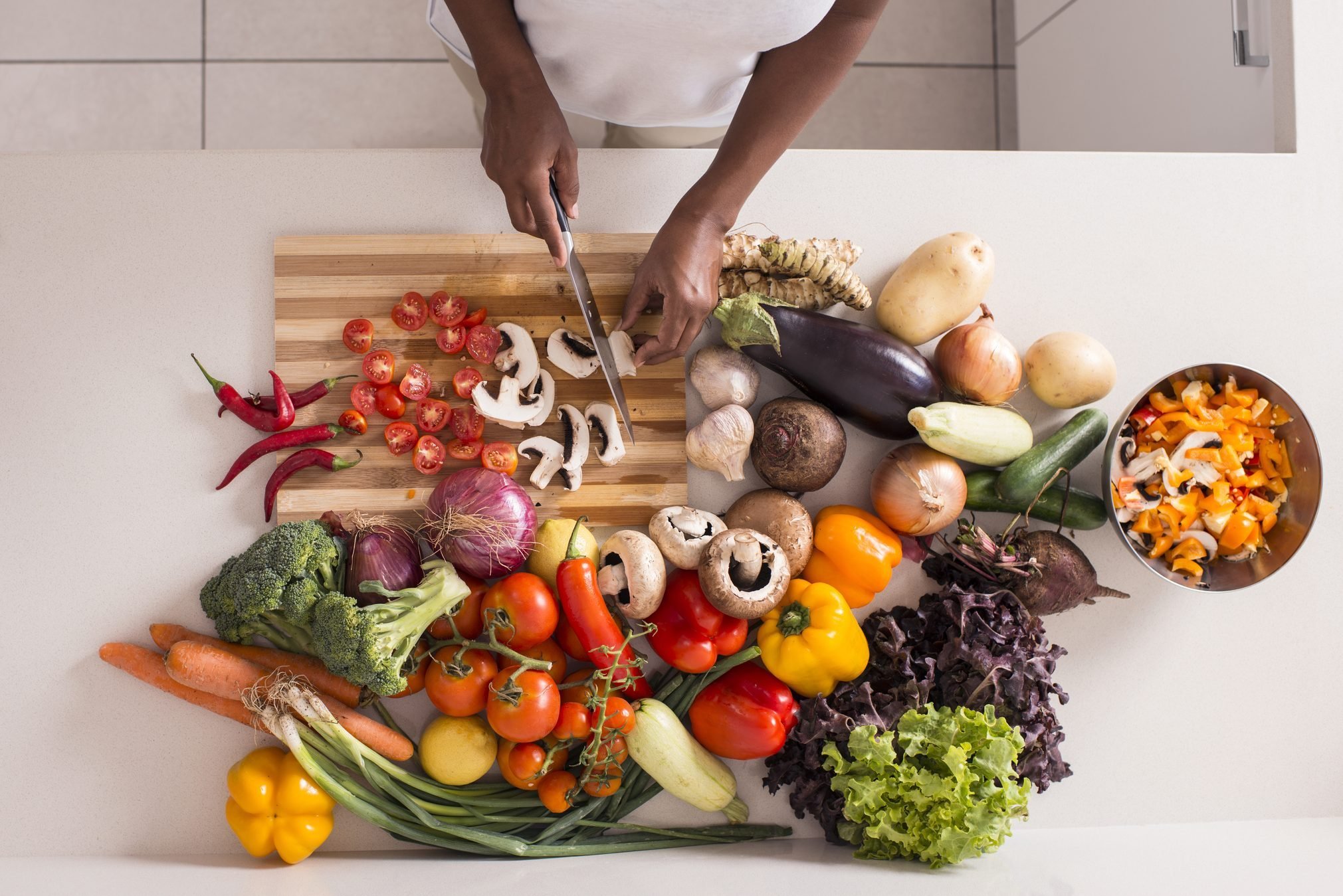Trying Plant-Based Eating? Here Are Dietitians’ 6 Sage Tips for Easing Your Body In
Updated: Jan. 11, 2023
Call it a win-win-win: Experts praise plant-based eating for the environment, your health, and of course, animals. Here's how they say you can navigate the diet's most common stumbling blocks.
What is a plant-based diet?
Once considered a fringe fad, plant-based eating is becoming a mainstay in kitchens across the U.S. A record number of people signed onto this year’s Veganuary, a global challenge to go green with your appetite in the new year. And while an estimated two percent of Americans maintain a fully vegan diet all year long, more of us are growing mindful of our meat, dairy, and fish consumption.
In fact, a report from Packaged Facts shows that almost 40 percent of Americans identify as “flexitarian,” a diet that prioritizes plant-based food while allowing for animal products in moderation. Among younger Americans between the ages of 24 and 39 years, that number climbs to more than half.
If you’re one of the many who are dabbling in more conscious eating, there are some new lessons to learn as you make the transition. Here, registered dietitians point out to The Healthy a few stumbling blocks that new plant-based eaters commonly encounter, whether you’re reducing meat and dairy to benefit the environment, animal welfare, or your own health.
Also read 4 Easy Tips for Safer Fruit and Vegetable Washing, from Food Safety and Nutrition Authorities
Skipping an adjustment period

Researchers have found that as much as 84 percent of vegans or vegetarians eventually return to eating meat. But this mirrored another trend among survey respondents: Among those who gave up their plant-based diet, most started it pretty abruptly.
However, says Dana Ellis Hunnes, PhD, MPH, RD, Senior Dietitian at UCLA Medical Center and author of Recipe For Survival, “A transition period helps you ease into [a plant-based diet].” Giving yourself some time to mentally adapt makes you more likely to stick with plant-based eating—but also, there are some physical benefits, too.
For example, Hunnes explains that if you’ve classically been a meat lover and then you make a sudden switch to grains and vegetables, you might experience some uncomfortable side effects from all that extra fiber, like gassiness or bloating.
Instead, she suggests, gradually reduce your meat and dairy consumption in a way that’s manageable for your taste and lifestyle. Try eating plant-based for one meal a day, or think about dialing down your meat consumption by opting for some vegetarian options without completely doing away with a food group like dairy. (Also read 10 Things That Happen to Your Body When You Start Eating More Fiber.)
Over-relying on processed foods
One slip some people make is to assume that just because something’s plant-based, it must be good for you. “Oreos and tortilla chips are technically vegan, but that doesn’t mean they support overall health,” says Maya Bach, RDN, MPH, a registered dietitian nutritionist who specializes in plant-based eating.
The same logic goes for mock meats that can be notoriously high in sodium while packing similar calorie content to animal products. Still, the experts say that there’s a place for certain processed vegan eats. “I like to encourage new [plant-based eaters] to think about these products as bridges, helping them to transition from animal-based protein to whole or minimally processed protein,” Bach says. Her top picks include edamame, tofu, and tempeh, but if you’re looking for more options, check out 13 more protein-packed plants.
A few more of Bach’s transitional tips? Look for lower sodium and lower fat meatless products, or consider doing a “50-50” split (like a chili made with firm tofu and beefless crumbles).
Another rule of thumb is to limit processed products to a few times a week. And regardless, know you’re probably still eating healthier than you were before.”These meatless alternatives are still better picks because they don’t contain any cholesterol like their animal-based counterparts,” she adds.
Obsessing over protein
Animal products are certainly protein-rich—but it’s a common misconception that vegans and vegetarians struggle to meet their daily requirement. Research published in Nutrients in 2019 contradicted this protein myth, pointing to data that showed plant-based eaters get more than enough. (As a crash course: The recommended daily allowance [RDA] for protein is 0.8 grams per two pounds of your body weight. That means a 150-pound person needs about 60 grams each day.)
“In this country, it’s really difficult to be protein-deficient,” Hunnes explains. “Almost everything we eat has some amount of protein in it—even an apple has half a gram.”
Want to see for yourself? Here are 35 ways nutritionists sneak protein into their diet, including plenty of plant-based ideas.
Overlooking certain nutrients
While it’s possible you’re fine protein-wise, there are some nutrient requirements new plant-based eaters may have a hard time meeting (at least initially).
The big one? Vitamin B12. This micronutrient plays a major role in maintaining a healthy nervous system and supporting energy levels (fatigue is one of several warning signs you may be B12-deficient, Bach says). But because it’s naturally found in animal products, vitamin B12 is the one nutrient plant-based eaters will need to get via supplements or fortified products like nutritional yeast. (If you’re not familiar with nutritional yeast, check out these 9 ways the flavor-packed seasoning benefits your diet.)
Bach also recommends plant-based eaters keep an eye on their vitamin D (here are four of the best vitamin D supplements, from our nutritionist team), zinc, iron, and calcium levels. And if you’re pregnant and eating plant-based, she suggests you should talk with your doctor about whether you’d benefit from supplementing with choline and omega-3 fatty acids.
Over-supplementing
While supplements can help you meet a healthy nutritional profile, it’s entirely possible (and potentially dangerous) to go overboard.
For example:
- Taking too many herbal extracts or “blends” can sometimes do more harm than good
- Some supplements may interfere with medications you take (here are 13 combos to avoid)
- It’s possible to take too much of a nutrient via supplementation (learn more about why)
That’s why it’s important to always consult with your doctor before adding a supplement or otherwise changing up your diet regimen.
Not communicating with your doctor
Speaking of your doctor, not disclosing that you’re following a vegan or plant-based diet to your healthcare provider is a major oversight, Bach says. “They need to know how to provide appropriate guidance and recommendations,” she explains.
Studies also suggest that restrictive eating patterns can trigger disordered eating. While there’s not necessarily a cause-and-effect relationship at play, research published in the Journal of the Academy of Nutrition Dietetics found that having a history of an eating disorder is associated with a greater likelihood of following a restrictive diet like vegetarianism.
Read more about what therapists have to say on how certain eating patterns can become an unhealthy obsession.
Get healthy eating insights daily from The Healthy newsletter and by following us on Facebook and Instagram. Also, keep reading:
- The 12 Vitamin K-Richest Foods for Healthy Aging, from a Nutritional Biochemist
- Nutrition Experts Share 6 Earth-Friendlier Ways to Enjoy Your Favorite Foods
- An Olympic Hopeful Runner Just Shared His Super Accessible Full-Body Workout
- Feeling Down? Here’s the Compelling Effect of Your Mental Health on Your Heart Health


















